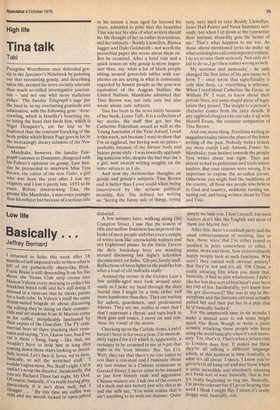Tina talk
Taki
Peregrine Worsthorne once defended gossip in the Spectator's Notebook by pointing out that recounting gossip, and describing salon life, seemed far more socially relevant than much so-called investigative journalism — `and not one whit more malicious either.' The Sunday Telegraph's sage put the boot in, to my everlasting gratitude and admiration, with the following gem: 'Arsecrawling, which is Jennifer's besetting sin, or biting the hand that feeds him, which is Nigel Dernpster's, are far less to be deplored than the constant knocking of the body politic which Bruce Page goes in for in the increasingly dreary columns of the New Statesman.'
Mandrake, however, the Sunday Telegraph's answer to Dempster, disagreed with his Fuhrer's opinions on gossip. Last Sunday he proceeded to interview Miss Tina Brown, the editor of the new Taller, a girl Who was born the year after I lost my virginity and I lost it pretty late. 1953 to be exact. Before interviewing Tina, the gnome-like Mandrake, a man even younger than his subject but because of a serious side 141111.1.111I to his nature a man aged far beyond his years, admitted in print that the beautiful Tina was not his idea of what writers should be. He thought of her as rather horrendous, and her subjects — Roddy Llewellyn, Bianca Jagger and Dido Goldsmith — not worth the proverbial paper she wrote about them on. But he recanted. After a brief visit and a quick lesson on why gossip is more important than, say, what a lot of black people sitting around green-felt tables with earphones on are saying in what is commonly regarded by honest people as the post-war equivalent of the Augean Stables, the United Nations, Mandrake admitted that Tina Brown was not only cute but also wrote about cute subjects.
Tina has been in the news lately because of her book, Loose Talk. It is a collection of her stories, the stuff that got her the Catherine Pakenham award as well as the Young Journalist of the Year Award. I read it this week, not because I want to show that I'm an egghead, but having won no prizes — probably because of my hirsute body and hairier prose style I was inwardly applauding someone who, despite the fact that she's a girl, won awards writing roughly on the same subjects as I do.
And now my Aristotelian thoughts on gossip and gossip's subjects. Tina Brown said it better than I ever could when being interviewed by the serious political monthly, Ritz. She 'defined her writing as: 'Seeing the funny side of things, trying very, very hard to take Roddy Llewellyn, Janet Hall-Porter and Nona Summers seriously, but when I sit down at the typewriter their intrinsic absurdity gets the better of me.' That's what happens to me too. As those above-mentioned jerks do make up what sociologists call contemporary culture, I do try to take them seriously. Not only do 1 fail to do so, I get their names wrong as well.
My ancestor and namesake — he only changed the first letter of his pen name to S from T — once wrote that superficiality is only skin deep, i.e. everything is relevant. When I read about Catherine the Great, or William IV, I want to know about their private lives, not some stupid piece of legislation they passed. The insight to a person's character comes from the juicy details. If any egghead disagrees he can take it up with Harold Evans, the constant companion of Tina Brown.
And one more thing. Frivolous writing in magazines today takes the place of the letter writing of the past. Nobody writes letters any more except Lady Antonia Fraser. So, Mandrake, your instinct towards the people Tina writes about was right. They are almost as bad as politicians and trade union leaders. But your reasons were wrong. It is important to expose the so-called jet-set. Otherwise you might find the backbone of the country, all those nice people who believe in God and country, suddenly turning on, tuning out, and being written about by Tina and Taki.










































 Previous page
Previous page